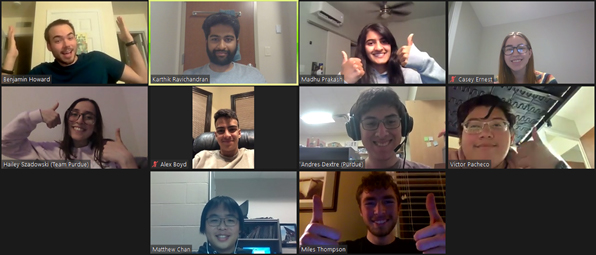Purdue iGEM takes Gold for a 3rd time
Purdue's International Genetically Engineered Machine Competition (iGEM) team won first prize in the 2020 iGEM Competition by developing a rapid, reliable, and accessible testing system for COVID-19.
Purdue iGEM's 2020 project on COVID-19 Rapid Microfluidic Point of Care Diagnostic Device.
"The Purdue iGEM team has won gold a total of three times: in 2012, 2013, and 2020," said Hailey Szadowski, President of Purdue iGEM. "We're extremely proud to make this achievement as we haven't earned gold in over seven years."
She said that all the Purdue iGEM Team members were very passionate about working towards finding a solution to something that has had such a significant impact on everyone's life.
"The COVID-19 pandemic affected all of our team members in multiple ways, ranging from many of us losing our internships to some of us not being able to return home for nearly a year due to travel restrictions," said Szadowski. "Our personal stories, as well as the stories of others, motivated us to work on such a project. We are extremely proud to have dedicated our summer to developing a rapid, reliable, and accessible testing system that can be used right now to lessen the implications of the COVID-19 pandemic and can be modified to prevent any future pandemics from escalating to such a severe level."
Purdue iGEM's winning project is called cArgo (COVID-19 Argonaute mediated microfluidic diagnostic). According to its website, the device is "a 3D printable microfluidic chip that is fully available to other teams for use in future projects. The chip is designed for high throughput RNA extraction and sequence detection and includes space for an experimental control design."
The twist in this year's project was that due to the COVID-19 pandemic, the team did its work virtually. Szadowski explained that the move to virtual changed their team and project structure quite significantly.
"Instead of having a team of seven interns complete our annual project on campus during Summer 2020, we had to quickly shift to a primarily online structure," she said. "This had a significant impact on our 2020 project: instead of only working on cArgo for one year, we decided to opt into a two-phase project to be completed during 2020 and 2021. During our first phase in 2020, we had very limited lab space access, so we focused on the design and planning of different parts of our device. During our second phase in 2021, we plan to test the previously-designed parts of our design and construct a physical prototype."

Purdue's 2020 iGEM team
Szadowski further explained that the second phase of iGEM's project is primarily focused on the development of the physical aspects of the diagnostic device. In 2021, the team plans to fabricate a prototype for cArgo, complete wet-lab experiments to further develop and test individual parts of the system, and make any necessary changes to the device to improve its reliability, accessibility, and ease-of-use.
The challenges brought by 2020 have permanently changed iGEM's structure, according to Szadowski. "Instead of having all interns work in-person, we have decided to make most of our summer internships remote with only one or two individuals on-campus to complete wet-lab experiments and collect data," she said. "This structure allowed us to have a total of 16 members on our team in 2020, and we hope that it will allow us to expand the size of our team in 2021 as well."
According to Szadowski, the team would like to expand its membership. "We are currently searching for members in ECE to help us develop and build the hardware/heating component of our device," she said. Contact the iGEM team igem@purdue.edu for more information.
Purdue iGEM teammates say they are grateful to their sponsors, advisors Dr. Kevin Solomon and graduate student Ethan Hillman, and their summer team for their success in 2020. They would like to thank their president, Madhu Prakash, and the director of the summer team, Ben Howard, for their leadership. As the only two returning members from last year’s iGEM team, Prakash and Howard had the experience and knowledge needed to lead Purdue iGEM to winning the gold medal. Purdue iGEM also thanks the iGEM Foundation for the competition opportunity.
2020 Purdue iGEM Team Members
Madhu Prakash, Ben Howard, Matthew Chan, Andres Dextre, Hailey Szadowski, Miles Thompson, Jieun (Grace) Lee, Dalton Saylor - ABE - Biological Engineering
Karthik Ravichandran - Biochemistry (College of Science, Chem)/Premed
Xander Weintraut - Computer Science
Swagat Bhattacharyya - ECE
Alex Boyd, Victor Pacheco - Biology/Premed
Ana Sternstorm - Biochemistry (Ag)
Purdue iGEM was founded in 2006, being one of the first in the Big Ten to do so. Its purpose and main focus is to use biological engineering to develop the field of synthetic biology to help society advance.
For more information: Purdue iGEM's cArgo project
